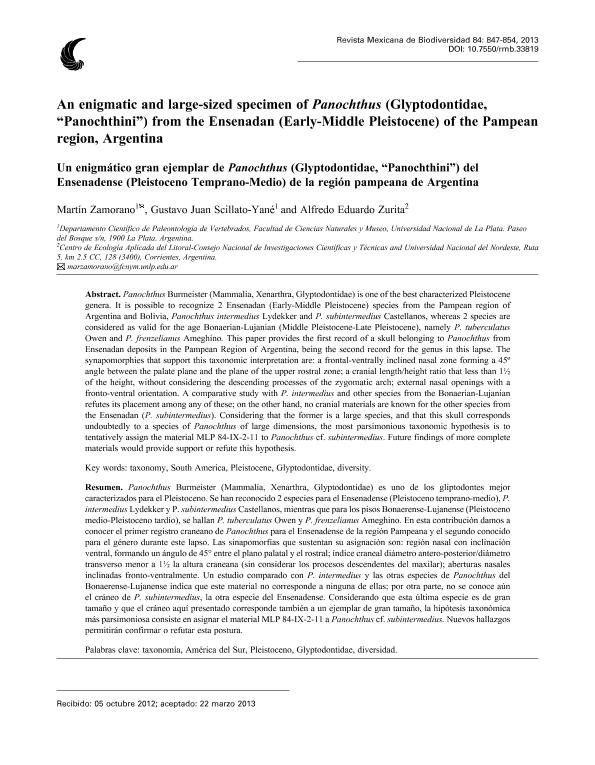Mostrar el registro sencillo del ítem
dc.contributor.author
Zamorano, Martín

dc.contributor.author
Scillato, Gustavo Juan

dc.contributor.author
Zurita, Alfredo Eduardo

dc.date.available
2016-09-07T19:19:49Z
dc.date.issued
2013-07
dc.identifier.citation
Zamorano, Martín; Scillato, Gustavo Juan; Zurita, Alfredo Eduardo; An enigmatic and large-seize specimen of Panochthus (Glyptodontidae, "Panochthini") from the Ensenadan (Early-Middle Pleistocene) of the Pampean region, Argentina; Inst Biologia; Revista Mexicana de Biodiversidad; 84; 3; 7-2013; 847-854
dc.identifier.issn
1870-3453
dc.identifier.uri
http://hdl.handle.net/11336/7523
dc.description.abstract
Panochthus Burmeister (Mammalia, Xenarthra, Glyptodontidae) is one of the best characterized Pleistocene genera. It is possible to recognize 2 Ensenadan (Early-Middle Pleistocene) species from the Pampean region of Argentina and Bolivia, Panochthus intermedius Lydekker and P. subintermedius Castellanos, whereas 2 species are considered as valid for the age Bonaerian-Lujanian (Middle Pleistocene-Late Pleistocene), namely P. tuberculatus Owen and P. frenzelianus Ameghino. This paper provides the first record of a skull belonging to Panochthus from Ensenadan deposits in the Pampean Region of Argentina, being the second record for the genus in this lapse. The synapomorphies that support this taxonomic interpretation are: a frontal-ventrally inclined nasal zone forming a 45º angle between the palate plane and the plane of the upper rostral zone; a cranial length/height ratio that less than 1½ of the height, without considering the descending processes of the zygomatic arch; external nasal openings with a fronto-ventral orientation. A comparative study with P. intermedius and other species from the Bonaerian-Lujanian refutes its placement among any of these; on the other hand, no cranial materials are known for the other species from the Ensenadan (P. subintermedius). Considering that the former is a large species, and that this skull corresponds undoubtedly to a species of Panochthus of large dimensions, the most parsimonious taxonomic hypothesis is to tentatively assign the material MLP 84-IX-2-11 to Panochthus cf. subintermedius. Future findings of more complete materials would provide support or refute this hypothesis.
dc.format
application/pdf
dc.language.iso
eng
dc.publisher
Inst Biologia

dc.rights
info:eu-repo/semantics/openAccess
dc.rights.uri
https://creativecommons.org/licenses/by-nc-nd/2.5/ar/
dc.subject
South America
dc.subject
Pleistocene
dc.subject
Glyptodontidae
dc.subject
Panochthus
dc.subject.classification
Paleontología

dc.subject.classification
Ciencias de la Tierra y relacionadas con el Medio Ambiente

dc.subject.classification
CIENCIAS NATURALES Y EXACTAS

dc.title
An enigmatic and large-seize specimen of Panochthus (Glyptodontidae, "Panochthini") from the Ensenadan (Early-Middle Pleistocene) of the Pampean region, Argentina
dc.title
Un enigmático gran ejemplar de Panochthus (Glyptodontidae, “Panochthini”) del
Ensenadense (Pleistoceno Temprano-Medio) de la región pampeana de Argentina
dc.type
info:eu-repo/semantics/article
dc.type
info:ar-repo/semantics/artículo
dc.type
info:eu-repo/semantics/publishedVersion
dc.date.updated
2015-06-16T22:13:28Z
dc.journal.volume
84
dc.journal.number
3
dc.journal.pagination
847-854
dc.journal.pais
México

dc.journal.ciudad
México
dc.description.fil
Fil: Zamorano, Martín. Universidad Nacional de la Plata. Facultad de Ciencias Naturales y Museo. División Paleontología Vertebrados; Argentina
dc.description.fil
Fil: Scillato, Gustavo Juan. Universidad Nacional de la Plata. Facultad de Cs.naturales y Museo. Div.paleontologia Vertebrados; Argentina
dc.description.fil
Fil: Zurita, Alfredo Eduardo. Consejo Nacional de Investigaciones Científicas y Técnicas. Centro Científico Tecnológico Nordeste. Centro de Ecologia Aplicada del Litoral (i); Argentina
dc.journal.title
Revista Mexicana de Biodiversidad

dc.relation.alternativeid
info:eu-repo/semantics/altIdentifier/url/http://www.sciencedirect.com/science/article/pii/S1870345313729117
dc.relation.alternativeid
info:eu-repo/semantics/altIdentifier/doi/http://dx.doi.org/10.7550/rmb.33819
Archivos asociados
